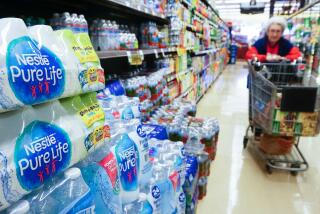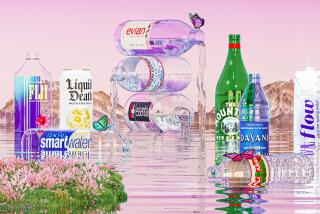Bottled Water Versus Tap: Choice Is Clearly Yours
- Share via
As much of the nation sweats through another sweltering summer, the bottled-water industry is riding a tidal wave of unprecedented demand among thirsty Americans.
Sales in the United States reached 3.6 billion gallons in 1998, jumping more than 10% from 1997 sales, according to figures released this month by the International Bottled Water Assn.
But as schools, offices and fitness centers become awash in bottled-water believers, some experts question whether water in a bottle offers any clear health advantages over the water from your kitchen sink.
Most health officials agree that the average person should drink at least eight glasses daily of water or other hydrating beverages such as milk or fruit juice. Caffeinated and alcoholic drinks, on the other hand, can rob the body of water. Proper hydration is essential for flushing out impurities, carrying nutrients throughout the body, cushioning joints and protecting organs and body tissue.
But fewer officials and researchers agree over the relative quality of water from different sources.
“One difference is that in a bottle of water, once the bottle is sealed, that’s it--nothing happens to it,” said Stephen Edberg, a professor of clinical microbiology at Yale Medical School. “The bottler can tell you exactly what’s in the bottle.” Tap water is more variable, he said, because it must travel through plumbing to reach its final destination.
In 1995 and 1996, 13 states reported 22 outbreaks associated with contaminated drinking water, according to the Centers for Disease Control and Prevention in Atlanta. More than 2,500 people became ill, though no deaths were reported.
Only 10 of those outbreaks, however, were linked to community water systems. And of those, only three resulted from problems at water treatment plants.
Edberg said another major difference between bottled water and tap water is that consumers can choose among different bottled-water sources.
*
Bottled water brands boast of exotic sources like snow-melt from the Swiss and French Alps, an aquifer in a Maine pine forest, and a pristine spring in the Allegheny Mountains.
But some water district officials said their tap water is just as pure and just as good as bottled water--maybe even better.
Bottled water falls under the watchful eye of the Food and Drug Administration and the International Bottled Water Assn., said association spokeswoman Cindy Yablonski. The association represents 85% of bottled water sold in the United States.
But regardless of where people get their drinking water, they need to be informed, Edberg said.
The labels on bottled water should include some way of contacting the company so consumers can ask where the water comes from and what’s in it, he said.
More to Read
Inside the business of entertainment
The Wide Shot brings you news, analysis and insights on everything from streaming wars to production — and what it all means for the future.
You may occasionally receive promotional content from the Los Angeles Times.










